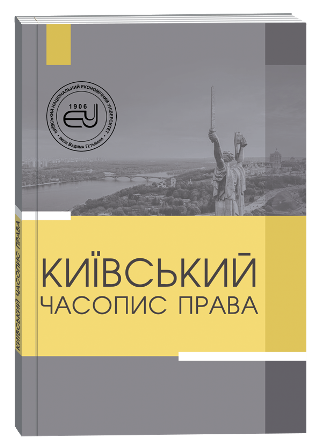РОЗУМНІСТЬ СТРОКІВ РОЗГЛЯДУ СПРАВИ У ПРОФЕСІЙНІЙ ДІЯЛЬНОСТІ СУДДІВ В УКРАЇНІ
DOI:
https://doi.org/10.32782/klj/2021.3.12Ключові слова:
строк, термін, час, розум, розумність, розумний строк розгляду справи.Анотація
У статті досліджено проблеми практичного вирішення професійними суддями в Україні оціночнихі суб’єктивних питань, що виникають у процесі дотримання принципу розгляду справи у розумний строк.Досліджуючи строки у будь-якому юридичному процесі (кримінальному, цивільному, адміністративно-му, адміністративно-деліктному, господарському), автор дійшов висновку щодо їх принципової нетотожнос-ті строкам та термінам у матеріальному праві.За результатами дослідження визначено таке. По-перше, як правило, процесуальні строки мають чіт-ко виражений імперативний характер, але з урахуванням принципової неможливості встановити їх на всівипадки життя чинне законодавство дає можливість суддям визначати їх на власний розсуд, що з урахуван-ням виключної законної процедури їх (строків) окреслення (кодекси і закони) наближає вітчизняну правовусистему до прецедентної, адже судді фактично перетворюються на законотворців.По-друге, даючи змогу суддям встановлювати окремі процесуальні строки за власним розсудом, держававимагає, щоб вони відповідали критерію розумності, який на власному авторському рівні сприймається як тер-мін, який можна використовувати у професійній діяльності суддів там, де неможливо встановити універсальнінормативні стандарти і, відповідно, там, де необхідно буде скористатися суддівським розумом та ініціативою.По-третє, розумність строків розгляду справи національними судами є оціночною категорією, яка, висту-паючи мірою свободи діяльності відповідних осіб, постійно обмежується державою на рівні окремих норма-тивно-правових актів та постанов вищих судів. Проблема проявляється не в самому факті обмеження такоїсвободи, а у розмитості (незрозумілості) критеріїв (умов), які встановлюються для такої процедури, а такожу вкрай вимогливому ставленні до суддів із точки зору прогнозування ними потенційних проблем із дотри-мання розумних строків розгляду справи.
Посилання
Час. Wikipedia. URL: https://uk.wikipedia.org/wiki/час.
Цивільний кодекс України від 16 січня 2003 року. URL: https://zakon.rada.gov.ua/laws/show/435-15/print.
Кодекс України про адміністративні правопорушення від 7 грудня 1984 року. URL: https://zakon.rada.gov.ua/laws/show/80731-10#Text.
Цивільний процесуальний кодекс України від 18 березня 2004 року. URL: https://zakon.rada.gov.ua/laws/show/1618-15.
Кримінальний процесуальний кодекс України від 13 квітня 2012 року. URL: https://zakon.rada.gov.ua/laws/show/4651-17#Text.
Кодекс адміністративного судочинства від 6 липня 2005 року. URL: https://zakon.rada.gov.ua/laws/show/2747-15#Text.
Господарський процесуальний кодекс України від 6 листопада 1991 року. URL: https://zakon.rada.gov.ua/laws/show/1798-12#Text.
Сперанский М. Основания российского права. Правоведение. 2001. № 4. С. 231–243.
Розум. URL: http://sum.in.ua/s/rozum.
Мислення. Розум. Інтелект. URL: https://kumlk.kpi.ua/node/1391.
Розум. URL: https://uk.wikipedia.org/wiki/Розум.







